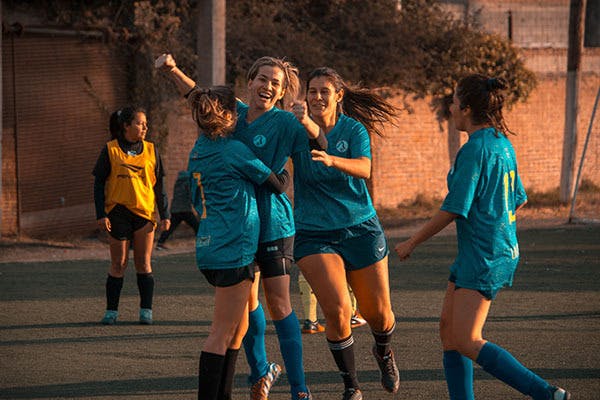The language we use around sports has some catching up to do. While we extol fair play, teamwork and participation, sometimes individuals or groups are treated differently because of gender, race, sexuality or disability. And it shows up in words.
Take UEFA Women’s Euro 2022. It was a massive opportunity to cement the sport in people’s minds, but a number of brand sponsors just sounded patronising or worse, unwittingly reinforced harmful misconceptions.
Visa’s “When more of us play, all of us win” fell into the patronising camp – a consolatory pat on the back for taking part and another example of professional sportswomen being held up as the answer to gender inequality in society. LinkedIn’s “Follow in her footsteps” unhelpfully framed women today as stepping stones for those of tomorrow. The aim of Heineken’s “The 12th woman” (a twist on the term for collective fan support, the 12th man), was to challenge gender bias and stereotypes. But it also inadvertently amplified the negative idea of the “woke police” – making people feel they can’t say anything right these days. Or that gender bias could be solved with a t-shirt.
There are, of course, brands who have made challenging social injustice a central part of their MO. Nike’s been at the forefront for years. Two recent standouts include the 2018 Colin Kaepernick campaign supporting a divisive figure and siding with anti-racism, and the 2021 “The Land of New Football” that featured a diverse cast including gay, straight, black and white people, the UK’s first Muslim referee, a breastfeeding woman and grassroot teams. The message? The joy of sport should be for everyone, no exceptions. To back up their words with deeds, in 2020 Nike committed $40million to social justice and racial inequality.
And yet, there’s obviously a lot of work still to be done. So how can brands encourage more inclusion and fairness in sports? And, if they’re sincere about moving the dial, how should they talk about it?

Every word matters
The “North London Derby” is one of the richest, most evocative phrases in English football. And for 99% of the population, it’s tied to the men’s game. But none of that mattered to whoever was responsible for the marketing of the recent Women’s Super League match between Arsenal and Spurs.
Sure, some people might have got confused momentarily by the omission of the word “women’s”. But it’s a small price to pay for the confidence that comes with saying “This is the NLD”. It’s also a small shift with big impact.
The Premier League’s “No Room for Racism” campaign is another smart use of language. It’s direct, uncompromising and focused solely on one issue: that there’s no room for racism in English football. Contrast that with the “One Love” campaign for the 2022 World Cup in Qatar. Supported by ten European nations, “One Love” is vague enough so no one can dispute it, and mushy enough not to cause offence. But it’s also so non-committal that it doesn’t really say anything at all. If you’re really against homophobia, say so.
But one slogan can’t do it all
We’re not saying words are the only thing that matter here. They should express the values, objectives or policies already in place. Which then needs to roll out across multiple touchpoints. Be wide-reaching and consistent, or it can go spectacularly wrong (an off-message quote, a toe-curling circular, a cringe-worthy newsletter). A “toolkit” could be valuable – a one-liner is a useful hook to attract attention, but then you need to follow up with different messages on the practical steps you’re taking to address the problem.
When brands get equality, diversity and inclusion wrong, part of the problem is that people don’t know how to talk about these big subjects. Maybe they fear causing greater offence or upsetting some of their fanbase. Maybe they feel a gesture was enough. Maybe they should’ve brought in subject matter experts to help educate the organisation and get the messaging right.
Look at the NFL’s mishandling of Hispanic Heritage Month. An external point of view might’ve helped. It would’ve at least shown they were taking their words seriously. But this is tricky, and we don’t want to beat up brands for making an effort (so long as it’s sincere). And it’s not about being “perfect” at all times – there should always be room to learn.
With billions of sport fans around the world, brands have a real opportunity here to actively push for positive change. To not only keep up with issues around equality, diversity and inclusion, but perhaps even lead on them – through actions and words.
This article was originally published on Sports Insight.




